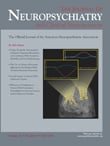Affective Prosopagnosia and “Hoccleve’s Complaint”
…like a wild bull/Crazed of expression/Holding my head from too high/Overbearing and proud in the brain/Like a six point stag. 1
And when I got home, and found myself aloneAnd in my own room,I struggled to the mirror,To see if it was my face that stared back,Or some other guy’s, someone not quite right,Some vision that throughCunning and force I could dispel. 1
…the experience of inner alienation from one’s reflected face, which is perceived as independently alive, sinister, and generally physically distorted.” 2
References
Information & Authors
Information
Published In
History
Authors
Metrics & Citations
Metrics
Citations
Export Citations
If you have the appropriate software installed, you can download article citation data to the citation manager of your choice. Simply select your manager software from the list below and click Download.
For more information or tips please see 'Downloading to a citation manager' in the Help menu.
View Options
View options
PDF/EPUB
View PDF/EPUBGet Access
Login options
Already a subscriber? Access your subscription through your login credentials or your institution for full access to this article.
Personal login Institutional Login Open Athens loginNot a subscriber?
PsychiatryOnline subscription options offer access to the DSM-5-TR® library, books, journals, CME, and patient resources. This all-in-one virtual library provides psychiatrists and mental health professionals with key resources for diagnosis, treatment, research, and professional development.
Need more help? PsychiatryOnline Customer Service may be reached by emailing [email protected] or by calling 800-368-5777 (in the U.S.) or 703-907-7322 (outside the U.S.).

